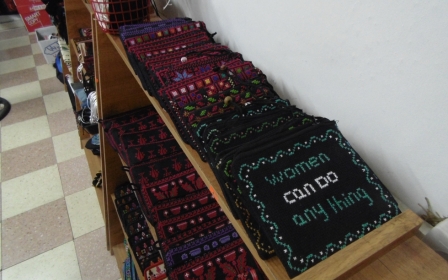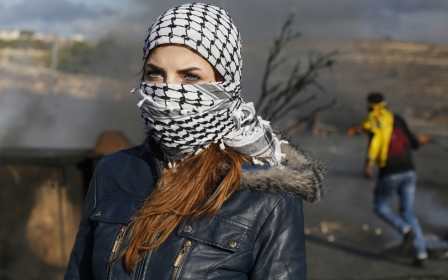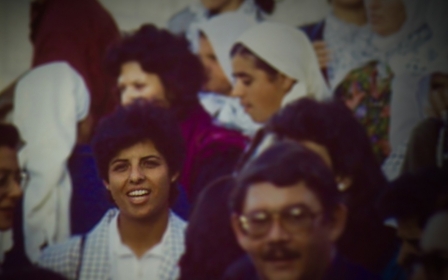Palestinian women face barrage of sexual harassment online, report finds
One third of Palestinian women in the West Bank, Gaza Strip and inside Israel have been subjected to various forms of sexual violence and harassment online, a first-of-its kind study has revealed.
That harassment - a result of the patriarchal society they live in and the Israeli occupation - has caused women and girls to lose the ability to express themselves freely online, said the report, published by the Arab Center for the Development of Social Media (7amleh) and the Swedish Kvinna til Kvinna Foundation.
“It starts from things that are kind of a grey area, like sending many messages to the same person who is not responding or to keep sending requests for friendship on social media platforms like Facebook,” Nadim Nashif, 7amleh’s executive director, told MEE.
“Then it goes beyond those seemingly simple acts: sending nude pictures, pornographic material, or posting inappropriate messages on someone's pictures. It's a wide range of abuse. It reaches extreme cases when they release private pictures of the [victim] and then they start a process of extortion.”
We all knew that the harassment exists but the main takeaway is the [scope] of it ... Lots of work needs to be done within our society
- Nadim Nashif, 7amleh’s executive director
The study, released on 22 November, zeroed in on gender-based violence on social networks such as Facebook, Instagram and Snapchat.
Its results are based on testimonies collected during six focus groups - in the West Bank, Jerusalem, Gaza Strip, Haifa and the Galilee - and a poll of 1,200 Palestinian women aged 15 to 30.
There was a noted upsurge in digital harassment against Palestinian women and girls over the last few years, the report found, ranging from hacking women’s accounts to publishing their personal details online, extortion, and sending pictures with inappropriate content.
Sara, a Palestinian woman from Beit Hanoun in the Gaza Strip, told the story of a friend who had fallen victim to online blackmail.
"My friend had two Facebook accounts," said Sara, who is quoted in the report using only her first name.
"A man was threatening her to publicly post her photos if she doesn’t do what he asks her to... She was afraid because none of her family members knew she had another Facebook account where she posts pictures of herself."
Online surveillance
According to the poll, 30 percent of the women reported attempts to hack their social media accounts, 33 percent said they received pornographic photos and videos without their consent, 16 percent said they were sexually harassed and five percent said they were subjected to sexual extortion.
The abuse forced more than one in five female respondents (22 percent) to withdraw from social media and the internet outright, the survey found.
Palestinian women also complained of “familial and social surveillance that monitors [and intervenes in] their moves online, resulting in increased pressure to censor themselves”, according to the report, A Violent Network: Gender-Based Violence Against Palestinian Women in Virtual Space.
"Having your parents on Facebook has its effects: You start rethinking the posts you want to write, or photos you want to share, or people you want to connect with," said Susan, a Palestinian woman from Ramallah, in the West Bank, who was quoted in the report using only her first name.
More than half of the women surveyed across the geographic areas said they didn't trust the police to handle cases of online abuse. Instead, many said they dealt with the issue personally within family and friend circles instead.
“There's a lot of criticism of the police, that they're not sensitive or discrete enough,” Nashif, of 7amleh, said.
“Some [women] block the harasser and disable all their social media accounts,” he added, saying that 7amleh has spoken to many women who chose to leave Facebook as a result of the harassment they experience there.
Some Palestinian women in the Naqab (Negev) desert area in southern Israel also expressed a preference for private chat tools like Whatsapp. But that’s problematic, Nashif said, since not going on the internet means they don’t have access to information and other knowledge they need to develop.
“As a digital rights organisation we see it as important to be connected,” he said. “It also widens the digital gap between males and females and the power relationship between them.”
Freedom of expression restricted
Half of the women polled blamed male chauvinism and men's societal and family upbringing for online harassment, while 78 percent blamed families for not supervising what happens online. Nashif said several women also blamed the victims for the harassment they experienced.
Indeed, “gender-based violence in virtual space mirrors the violence in public space”, the report found.
In other words, while social media has become highly accessible, “women are still subject to patriarchal authority” online, “which limits their freedom and shapes how they interact online”.
“We all knew that the harassment exists but the main takeaway is the [scope] of it,” Nashif said.
“A lot of men need more education on how to behave. Lots of work needs to be done within our society targeting men.”
New MEE newsletter: Jerusalem Dispatch
Sign up to get the latest insights and analysis on Israel-Palestine, alongside Turkey Unpacked and other MEE newsletters
Middle East Eye delivers independent and unrivalled coverage and analysis of the Middle East, North Africa and beyond. To learn more about republishing this content and the associated fees, please fill out this form. More about MEE can be found here.




